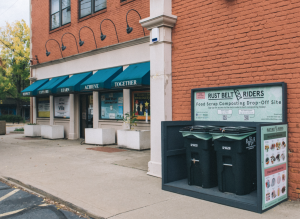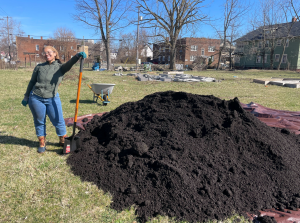Rust Belt Riders Offers 250 Free Compost Drop-Off Subscriptions to Eligible Cleveland Residents
Print this Article | Send to Colleague
Many composting programs across the country operate on an opt-in, subscription-based basis. This means that, for individuals and households that can’t afford an additional monthly subscription, sending food waste to landfills is not an active choice , but a forced behavior due to an issue of access. In an effort to close the composting access gap, USCC Member Rust Belt Riders is launching a new program in partnership with the City of Cleveland to offer 250 free compost drop-off subscriptions to eligible Cleveland residents. Using USDA grant funding through the Composting and Food Waste Reduction (CFWR) Cooperative Agreements program, Rust Belt Riders will expand their existing food scrap Drop-Off program to underserved neighborhoods in Cleveland and provide finished compost back to community food-growing projects.
Rust Belt Riders’ Residential Program Coordinator Natalie Şentürk tells USCC more about the new additions to their program:
 We’ll have 10 new drop-off sites in neighborhoods across the city—7 are already up and running, and 3 more will be coming in July 2025. This brings us to a total of 57 public collection sites throughout the Greater Cleveland area! [...] The grant funds 250 free annual memberships for two years each to SNAP-eligible residents to be able to use any site within Cleveland-proper.
We’ll have 10 new drop-off sites in neighborhoods across the city—7 are already up and running, and 3 more will be coming in July 2025. This brings us to a total of 57 public collection sites throughout the Greater Cleveland area! [...] The grant funds 250 free annual memberships for two years each to SNAP-eligible residents to be able to use any site within Cleveland-proper.
We’re “closing the loop” by giving the finished compost back to the community free of charge. We distributed about 340 yards of finished compost to food-growing community garden projects and orgs., delivered in bulk, 6-yard dumps. We will give back another 340 yards next spring. We are paid for this compost through the grant funding, making it completely free for recipients while still supporting our operations.
The national composting field is full of strong public-private partnerships between municipalities and composting companies or nonprofits that provide residents with compost drop-off options, whether free or subscription-based. Rust Belt Riders’ program stands out in its focus on underserved communities. Şentürk explains, “The 10 new sites themselves were also chosen with equity in mind, based on Cleveland’s ‘15-minute city’ idea—that ideally, no matter where you live, you have a compost [Drop-Off] site nearby. We used gaps in the map between our existing Drop-Off collection sites, of which there are 57 total in the Greater Cleveland area, to choose these locations. We placed them at Rec. Centers and Community Development Corporations (CDCs) that are hubs for each neighborhood.” Further, the program has an educational component: Rust Belt Riders is providing 17 individuals with stipends to serve as trained Compost Ambassadors who will spread word about the new Drop-Off Sites and help ensure that residents in communities that previously had no composting can take full advantage of the program.
All food waste collected in Rust Belt Riders’ programs is composted—“no landfilling, no waste-to-energy,” says Şentürk. The company produces NOP-compliant soil products under their brand Tilth Soil, which are sold and donated back to the communities that give Rust Belt Riders their organic waste. Feedstocks that contain non-NOP-compliant materials such as single-use compostable products are composted and used as topsoil.
Rust Belt Riders’ program sets a strong example for composters and municipalities trying to create similar access-oriented programs. Şentürk advises other composters to think of access as a multi-dimensional issue: consider multiple access barriers—geographic, financial, and educational—and shape a program that addresses them. They underscore the parts of Rust Belt Riders’ program that contribute to its success: partnering with municipalities, leveraging federal grants to fund programs, and developing outreach that includes online videos, on-the-ground tabling, and community education. “Finally,” says Şentürk, “don’t forget to center equitable access to services and give back in concrete ways to the communities you are working with!” By fostering programs like these through strong public-private partnerships, composters across the country can help close the compost access gap.
All Cleveland residents who are SNAP recipients can sign up for a free membership to Rust Belt Riders’ Drop-Off locations using this link. All other Cleveland residents can sign up for $12/month here. If you have any questions about the program you can call or email Rust Belt Riders directly at info@rustbeltriders.com

Pictured: Compost Ambassador Isis Duncan standing next to a pile of donated, finished compost that she helped a community farm receive. Photo credits to Rust Belt Riders

